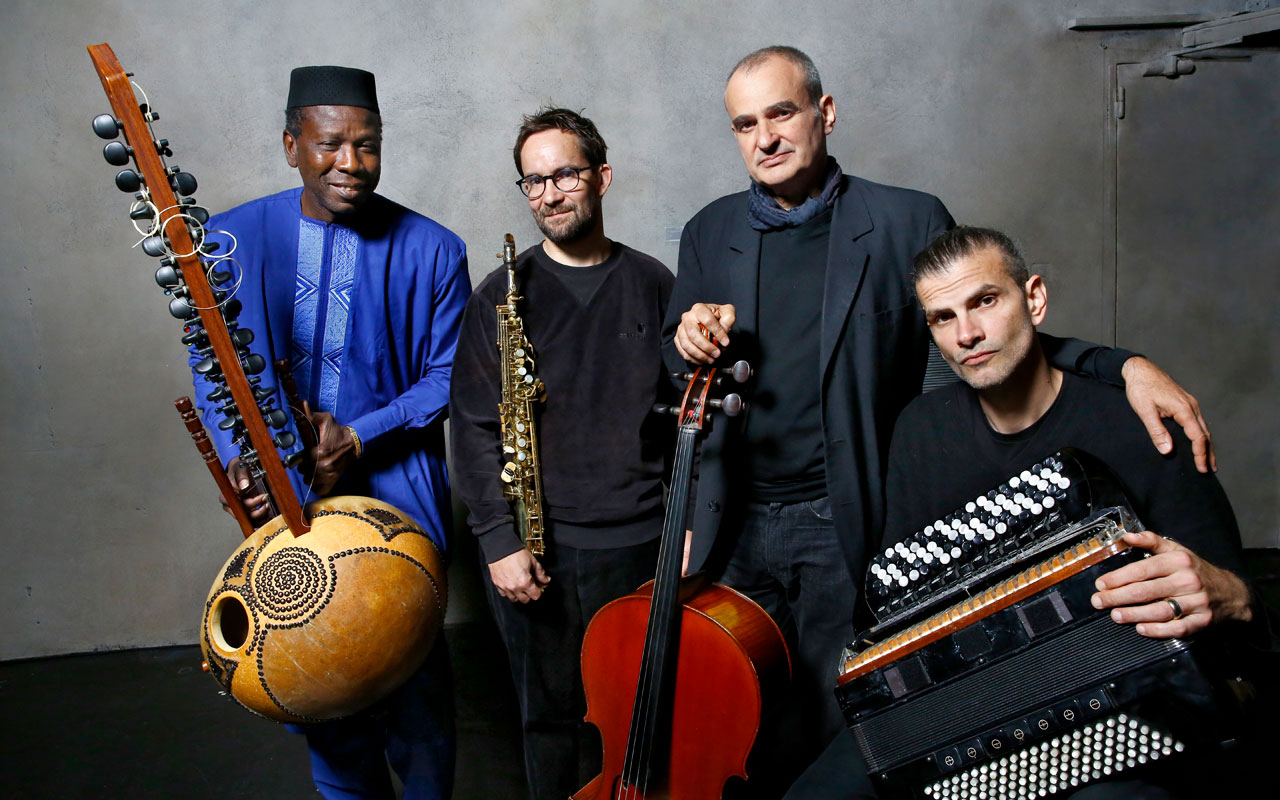
Ballaké Sissoko, Émile Parisien, Vincent Segal, and Vincent Peirani photo by Claude Gassian
Saturday, March 29, 7:30pm
Town Hall Forum
1119 8th Ave
$15-45 or Gold Pass*
Malian kora, cello, saxophone/flute, and accordion. This is an unusual combination of instruments, but bringing together four Francophone grandmasters–Ballaké Sissoko, Vincent Ségal, Vincent Peirani, and Émile Parisien–this new quartet creates a delight of sound and creativity that’s refreshingly different. It’s tempting to look at the fusion music of this group as a clash of cultures. The classical griot folk of Malian kora player Ballaké Sissoko, combined with the experimental classical cello of his longtime partner Vincent Ségal butts up against the jazz accordion and flute/saxophone of fellow duo accordionist Vincent Peirani and sax player Émile Parisien. It’s also possible to look at this music as experimentation endemic to each of these artists’ careers. Sissoko and Ségal’s earlier groundbreaking collaborations brought together the virtuosity of Malian kora with Western classical cello. For the other duo, Peirani has been developing a new language for the accordion in jazz and improvisational music in tandem with fellow French jazz explorer Parisien. But really the truest way to look at this music is through the group’s origin story.
The quartet had gathered together for the first time next to an ancient Roman amphitheatre in France for the 2019 edition of the festival, Les Nuits de Fourvière, tucked into an arbor in the shade of a hot afternoon in the outskirts of Lyon. Ségal had brought them together as a kind of musical salon, and that afternoon they played just for the joy of it, experimenting with new improvisations, each artist offering up melodies and ideas for the others. This impromptu jam would lead to their new album, Les Égarés, and would also inform the spirit of the ensemble: that creation and spontaneity should be a priority over rehearsing strict compositions. On the new album, the joy of creating music is palpable. Swells of collective melody rush in like an oncoming tide, swirling around and enveloping the listener. Then the tide draws back, and one of the soloists takes space, exploring and probing for new ideas while the rest of the ensemble supports in the background. Though much is new here, the quartet does enjoy some key covers. Notably, traditional Malian compositions, “Ta Nyé” and “Banja” bookend the album, reminding the listener that Sissoko’s pre-eminent kora lies at the real heart of the ensemble. A wildly creative version of global jazz pioneer Joe Zawinul’s “Orient Express” is another highlight of the album.
But perhaps one final way to look at the ensemble is from the lens of the Mediterranean world they came out of. The album was recorded in the Provencal alpine town of Gap, and Peirani comes from Nice in the South of France, while Parisien comes from the Occitan region of Lot. The Roman empire, whose stones reflected the sun on the day these four met to make music, touched on all of their lands, deep into North Africa, even as far South as Mali itself. It’s a reminder that the world we see today as so divided, has, even from the most ancient of times, been powerfully intertwined. Tickets on sale now at earshot.org.
*Learn more about Earshot Jazz’s new season pass the “Gold Pass” at earshot.org/goldpass.